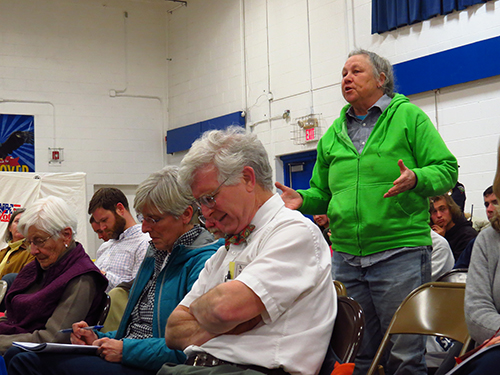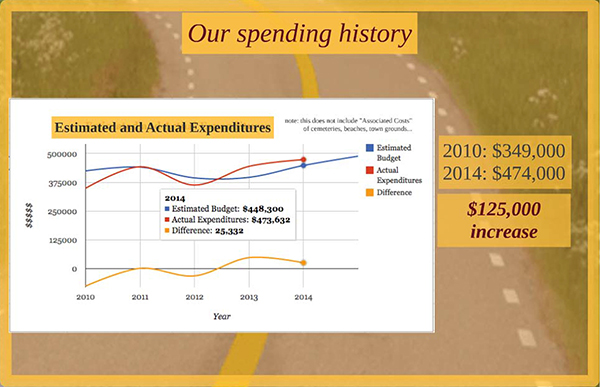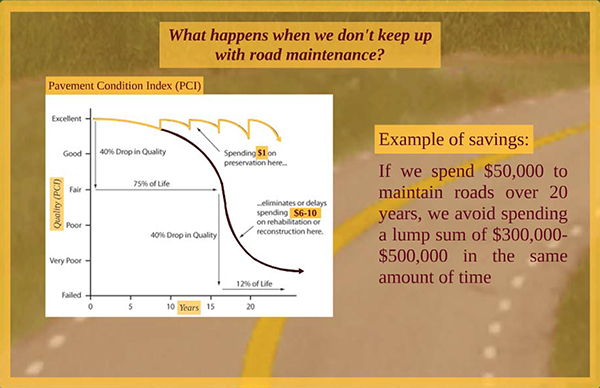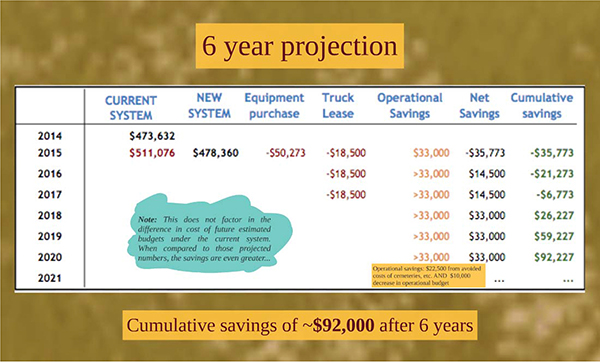
The 2015 Andover Town Meeting convened on March 10 in the AE/ MS gym at 7 PM. Duncan Coolidge, chair of the Board of Selectmen, took the floor to recognize many Andover citizens who have helped the Town. See the article on page ?? for the text of his comments.
Because Article 1 (election of officers for the year) was on the ballot during voting from 11 AM to 7 PM, the meeting started by addressing Article 2.

Article 2: Lease a one-ton truck for $55,509.
Sophie Viandier, member of the Board of Selectmen, projected a presentation on the screen and talked the audience through the major points behind Article 2, leasing a truck, and Article 3, equipment to be used by two new part-time highway department employees.
The budget presented in Article 4 is based on Articles 2 and 3 being approved, Sophie said, allowing us to lease a one-ton truck and hire two part-time employees for the highway department to take on a lot of routine maintenance of roads and grounds around town. We’re currently reacting to problems rather than doing preventative maintenance to avoid problems.

If the proposed 2015 budget were based on the same approach as last year, it would be $40,000 higher, and it still wouldn’t include adequate preventative maintenance.
This new plan comes from Road Agent John Thompson, with help from Town Administrator Marj Roy, the Board of Selectmen, and the Budget Committee.
We currently pay $35 per hour for labor for routine maintenance or for major projects.
Under the new plan, the Road Agent would supervise two new 32-hour-per-week Town employees making $10 to $15 per hour to handle routine maintenance of Town roads, grounds, and facilities.

Andy Guptill: Andy said that he’d analyzed the figures and that the truck pays for itself in just four hours of use per week. He said he’d vote in favor of this plan.
Toby Locke asked why we’d lease instead of buy. John Thompson explained that with an escape clause in the lease and a $1 buyout at the end, it was a better deal for the Town to lease than to buy.
Jeff Newcomb asked why the increase in FICA and Workers Compensation insurance for the two new employees isn’t reflected in the 2015 budget. Marj Roy explained that the rules for making the budget don’t allow those expenses to appear this year, but they will appear next year.
Jeff Newcomb stated that we need to factor in replacement cost for all the equipment we’d buy if Article 3 is approved, as well as the cost of fertilizer.
Duncan Coolidge replied that this plan is the start of an eight-year cycle, which is the expected life of the truck. At the end of the cycle, it could start again with the lease of a new truck and purchase of new equipment to replace the old equipment.
Chuck Keyser asked: What if two people can’t do all the work you’ve got planned for them? I don’t think we should build toward a highway department of four or five part-time people. John Thompson replied that he agrees and that two people should be able to handle the scope of work that’s planned. Chuck pointed out that $10 or $12 per hour doesn’t buy you much in an employee any more.
Peter Zak asked the Budget Committee to speak to the new plan.
Arch Weathers, chair of the Budget Committee, spoke about designing a method to choose between contract labor and employee labor. “We’ve never had that choice before.” It’s up to the judgment of the Road Agent to run the highway department most efficiently, and we’re putting our faith in him.
Brad Hardie: “I think this is a great idea.” But paying the part-time employees a little more would be a good idea. And you might get more investment out of full-time employees. Duncan Coolidge said that the wages at this point are just suggestions.
David Powers said that if the truck were used for plowing, it might not last eight years.
Jeff Newcomb pointed out that purchasing this equipment is starting to grow our Town government bigger. “Really consider this, people, because this is where it’s going to go. I’m going to vote no.”
Bill Keyser pointed out that mowing the ball field at Blackwater Park is a specialized job and should therefore be omitted from this plan. “I think it would be cheaper to put it out to bid because you’d save on equipment, repairs, labor. I can’t see where the advantage is going to come from having employees mowing the cemeteries. Where are we going to store all the stuff?”
Duncan Coolidge said that the Board has no expectation of building a road department; it just is looking for some savings for the Town.
Janet Moore said that it would be too bad if we made the decision based on fear of big government.
Donna Duclos asked if contracting this work out at $35 per hour includes insurance, mowers, trucks, etc. Contracting it out might be a good deal if it does; we didn’t have good information about that in the presentation.
John Thompson clarified that $35 per hour does include insurance but not equipment – trucks, mowers, etc. cost extra.
Bill Keyer pointed out that when we put the cemetery mowing out to bid, it doesn’t matter to us how much of the bid is labor and how much is equipment.
Jeff Dickinson pointed out that discussing labor really isn’t relevant to Article 2. He also wished that more information about this plan had been available before Town Meeting.
With the discussion winding down, Moderator Dan Coolidge called the vote. It was too close to call the voice vote; Article 2 passed on a show of hands.
Article 3: $50,273 for maintenance equipment.
Howard Wilson offered to sell the Town his 48” mower, as well as operate it and haul it on his trailer.
Tom Frantz asked if the part-time employees will mow Blackwater Park or if the Recreation Committee can still bid out that job. Duncan Coolidge replied that the employees would be trained to meet the standards the Recreation Department expects. We won’t accept playing fields being turned into something less than desireable.
Article 3 passed on a voice vote.
Article 4: $1,478,648 for general municipal operations.
Moderator Dan Coolidge talked the meeting through the Town budget section by section.
Toby Locke was critical of the fact that last year the Town “built a building that nobody knew about and bought a building nobody knew about.” The moderator asked him to raise his concerns under Article 22, Other Business.
Wood Sutton questioned the sharp increase in health insurance costs. Marj Roy explained that the budget rules require health insurance to be budgeted on a “worst case”scenario, and since the bookkeeper will be full-time in 2015, the budget has to reflect the most expensive plan they might choose, even though they might choose a less expensive plan or none at all.
Jeff Miller asked about $600 savings in streetlights: How many were finally turned off? Did we spend about two hours debating the issue at last year’s Town Meeting for nothing?
Duncan Coolidge didn’t have the exact figures on hand but said that the savings are more than Jeff quoted and would continue year after year.
Toby Locke said that the streetlight at the Transfer Station should be on a motion sensor instead of leaving it on all the time. He also pointed out that the lights at the skateboard park are now on 24/7 because the kids have been messing with the timer.
Toby also asked if the figure in the budget for Debt Service reflected us being forced to pay taxes twice a year. Marj Roy said that they’d left last year’s amount in the budget just in case the Town was forced to borrow, though “I can’t imagine why we’d have to borrow with twice-a-year tax bills.” The meeting could reduce the amount; it’s the meeting’s prerogative.
Article 4 passed on an all-but-unanimous voice vote. A motion to restrict reconsideration of Articles 2, 3, and 4 also passed.
Article 5: To discontinue the Bridge Capital Reserve Fund and transfer its $225,000 to the general fund.
Duncan Coolidge: The New Hampshire Department of Revenue Administration required this change. The money for the Lawrence Street Bridge Project and the money for general bridge repair need to be in two separate funds, and that’s what Articles 5, 6, and 7 accomplish.
Article 5 passed unanimously.
Article 6: To establish a Capital Reserve Fund for the Lawrence Street Bridge Project and put $200,000 in this fund from the general fund.
Mary Hiller: Weren’t we going to do a bond for the Lawrence Street bridge?
Duncan Coolidge: We’re going to have to spend about $60,000 for an engineering study, and that could come out of this fund. The rest of this fund could go toward getting a bond. Federal funds aren’t expected to be available for this project until about 2022.
Article 6 passed unanimously.
Article 7: To establish a Capital Reserve Fund for general bridge rehabilitation and put $50,000 in this fund, with $25,000 to come from the general fund and $25,000 to be raised through taxation. After a brief discussion, Article 7 passed unanimously.
Article 8: To add $10,476 to the Revaluation Capital Reserve Fund. With no discussion, Article 8 passed all but unanimously.
Article 9: To add $25,000 to the Ambulance Capital Reserve Fund. Toby Locke asked how much is currently in the fund currently. The answer was $75,000. Article 9 passed unanimously.
Article 10: To add $3,000 to the Fire Emergency Labor Expendable Trust Fund. With no discussion, Article 10 passed unanimously.
Article 11: To add $7,500 to the Police Cruiser Capital Reserve Fund. With no discussion, Article 11 passed unanimously.
Article 12: To add $10,000 to add to the Highway Equipment Capital Reserve Fund. Toby Locke if this money would go toward purchasing the new truck. Answer: no, it’s for the eventual replacement of the grader. Article 12 passed unanimously.
Article 13: To establish a Technology Expendable Trust Fund, add $18,000 to it, and withdraw $16,231 from it for a computer network upgrade.
Arch Weathers: Money for technology used to be in the regular operating budget. But the state requirements are driving needs for more and better Town computers because most transactions are now directly linked to the state’s computers. We have to look at these expenses as capital expenses and save for them and establish a replacement schedule. This whole new area is here to stay, and we have to fund it, replace it, etc.
Greg Stetson: Isn’t there still money for technology in the operating budget?
Marj Roy: That money is for software support and an annual service contract. The technology upgrade in Article 13 is totally new this year.
Article 13 passed unanimously.
Article 14: To add $10,000 to the Town Buildings Expendable Trust Fund.
Toby Locke: Will this money be used to build any buildings we don’t know about? Answer: no.
Duncan Coolidge: The foundation of the Town Hall is cracked, and its heating system is old and needs to be replaced. That’s what this fund is for.
Article 14 passed unanimously.
Article 15: To add $10,000 to the Transfer Station Capital Reserve Fund.
Toby Locke: What will this money be spent on?
Duncan Coolidge: There is no specific capital expenditure planned. There is a substantial plan being developed to make the Transfer Station more efficient and cost-effective, and that plan will be presented at a later time.
Article 15 passed unanimously.
Article 16: To delegate the duties of the Cemetery Trustees to the Board of Selectmen.
Duncan Coolidge: The Selectmen suggested this idea because we have increasing difficulty filling these positions with people who can fulfill the responsibilities of the position.
Wood Sutton: I see nothing here about a sexton you say we need. We’ve had trustees for over 20 years, ever since I’ve been here. Maybe after today’s ballots are counted we’ll have trustees again.
Joanna Sumner: Every time we give up the right to choose and to vote, we need to be really careful.
Toby Locke: I’d volunteer to help. I think we should share the responsibility.
Marj Roy: We do have a sexton, and it’s in the budget for $500. The sexton meets with the bereaved and picks out the plot.
Toby Locke: If this passes and later we don’t like the way its working, how do we change it?
Duncan Coolidge: You’d just need a warrant article to change it back.
Lynn Baker asked for an overview of the responsibilities and the difficulties fulfilling them.
Jim Danforth: We’ve been extremely fortunate to have had Pat Cutter as cemetery trustee for so long. [Applause] The job requires a lot of experience in matching markers to maps, finding the right site, taking measurements from the right marker. The biggest issue is learning all that from scratch.
Jim Delaney: My son died this past summer, and we found the burial plot we’d purchased had been changed to a cremation plot. We couldn’t get anyone from the Cemetery Trustees to come help us when we needed it. Thank God for Pat Cutter, because she came out of retirement for a little while, did the paperwork and got everything ironed out, and my son was interred. But there was nobody on the Cemetery Trustees who would come forward to do their job.
Vicky Mishcon: Where’s the usual $4,000 warrant article for repairing stones in the cemeteries?
Jim Danforth: The Cemetery Trustees usually prepare that, and without them this year, preparing it slipped through the cracks.
Dennis Fenton: I think that the smartest thing you could do tonight is nothing. You may be creating a bigger problem than the one you’ve got. Forget this article, and hire a sexton.
Arch Weathers made a motion to table Article 16. The motion passed and Article 16 was tabled.
Article 17: To extend Hoyt Road for construction of a turnaround and access to Lot 15-230-100.
Marie Nardino, a resident of Hoyt Road: I received a letter in August about the turnaround for Town vehicles. This article also mentions a new lot. What will the use of the new lot be?
Jim Danforth: This is to give the Selectmen the option if the owner of the buildable lot decides to get permission and spend the money to extend the road. It wouldn’t be Town money. The lot is totally unrelated to the turnaround, which we hope to do this year within the existing roadway.
After much further discussion, Article 17 passed. [But wait! Half an hour later, it was brought up for reconsideration. See below.]
Article 18: To extend Emery Road to allow a home to be built on Lot 8-329-127. Article 18 passed with no discussion.
Article 19: To accept Johnson Lane as laid out between Cilleyville Road and Powers Lane for all traffic, and from Powers Lane to Routes 11 and 4 as a pedestrian way.
Jeff Miller asked if the road would be brought up to Town standards and the gates removed. Duncan Coolidge: The current owners will do both things before turning the road over to the Town.
Jim Danforth: Johnson Lane will connect again to Powers Lane, and we’ll get better access to the dry hydrant. It will be a pedestrian-only walkway from where Johnson Lane turns into Powers Lane, through the covered bridge, and out to Route 11.
Leighton Terwilliger: What about the school buses that are parked there?
Jim Danforth: It will be a horseshoe-shaped road. The buses are off to the side of that horseshoe already. All we’re going to do is to move the gates.
Mark Stetson: The Town already owns the right-of-way through the bridge.
Jim Danforth: Two or three years ago the state told us no, we don’t own it; it’s a private road. When we asked for a remedy to the problem, they said that this warrant article was it.
Steve Barton: What’s the benefit of getting this as a Town road? All I see is more maintenance cost.
Jim Danforth: Since RP Johnson and Son has moved off the property, the private road makes no sense. In the long run it will benefit the town to have those buildings better utilized, and we’ve been told by the owner that the private road is a handicap. If we get those buildings better utilized and get some more jobs in town, we’re all going to benefit.
Duncan Coolidge: The owners will pay for patching and culvert work and get it into shape.
Andy Guptill moved to amend the article by adding language about bringing the road up to Town standards, as approved by the Road Agent, at the cost of the landowner. Nancy Tripp moved to amend the amendment to use the word “expense” rather than “cost.” The amendment to the amendment passed. The amendment passed.
Paul Currier: Is there a record of having made Johnson Lane private? Jim Danforth: Yes. Paul Currier: Will there be a deed transferring the road to the Town? Jim Danforth: You’d have to ask legal counsel.
After much further discussion about boundaries, statutes, etc., Stacey Viandier moved to table Article 19 “until we’re sure we’re not getting into a legal hornets’ nest.” The motion passed, and Article 19 was tabled.
Article 17 Reconsidered: A motion to reconsider Article 17 (Hoyt Road) was discussed and passed, and discussion turned to Article 17 again.
Toby Locke: This reconsidering is the kind of underhanded stuff that happens after a third of the people leave. This was overwhelmingly passed earlier. The taxpayer should have access to his property. He still has to go through all the legal rules and permits before he uses it. Let’s amend this article to remove mention of the turnaround, since that’s going to be built in the Town right-of-way anyway; it doesn’t need to be in here.
The amendment passed. The amended article was defeated on a show of hands, 14 to 19.
Hearing concern that the count was incorrect, Moderator Dan Coolidge called for another show of hands. Article 17 passed 24 to 20 on the second show of hands.
Article 20: To enter into a 10-year lease with the Andover Horseshoe Club for 45 Monticello Drive. With no discussion, Article 20 passed unanimously.
Article 21: To authorize the Conservation Commission to expend funds for contributions to “qualified organizations” where the Town will retain no interest in the property.
Mary Anne Broshek, chair of the Conservation Commission, explained that this article would remove the requirement that the Town have a financial interest (and therefore a potential liability) in an easement property before the Conservation Commission could help make that easement happen.
Toby Locke asked if the Selectmen would say whether this is beneficial for the town or not. Duncan Coolidge: It’s in our best interest to vote for this. It keeps us out of financial obligations in the future.
Article 21 passed unanimously.
A motion was made to take Article 19 (Johnson Lane) off the table. The motion failed.
Article 22: Any other business.
Leighton Terwilliger: I beg you to get the building at Blackwater Park finished. [Applause]
Duncan Coolidge: I’d like to embarrass Toby by publicly saying “Thank you!” for all the work that you obviously put into Town Meeting, having read everything and read everything well before-hand, and then asking a lot of good and solid questions. [Applause]
Toby Locke: Where did the money come from for the compactor, and for the building bought from RP Johnson for the Transfer Station, and for the sand shed at White Oak? I don’t understand how all that happened without us voting on it at Town Meeting.
Jim Danforth: The Transfer Station stuff came out of the Transfer Station Capital Reserve Fund. The plan was discussed at Town Meeting after waiting to see what would happen with the trash co-op’s plan to build a Single Stream Recycling (SSR) plant. When that fell through, we decided against going with Cassella and we went with our own SSR.
Toby Locke: Isn’t it costing us $90 per ton for SSR?
Jim Danforth: All the projections we were given were that it would be $45 per ton and would therefore be our best option. The Selectmen have come up with a plan with new options that will be presented soon.
Sophie Viandier: The pole barn at White Oak was an EPA requirement. It will also house Town equipment and the new Town truck.
Toby Locke: The pole barn was inadequate before it was built. It’s too small.
John Thompson: It was intended just to get us started and keep just the salt under cover. I know it’s inadequate to our total needs, but it’s what we could afford.
Wood Sutton: I’d like to commend the Road Agent and his crew on keeping the roads clear during a very difficult winter this year. [Applause]
With that, the meeting was adjourned.